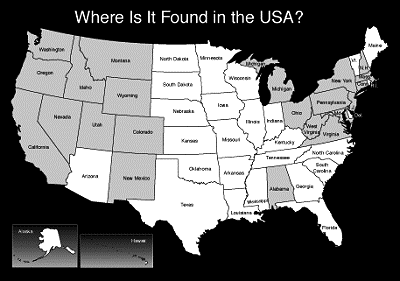
What's The Problem ?
does it really matter ?
IT WON'T HAPPEN IN MY NEIGHBORHOOD !
.. The Greater Yellowstone Ecosystem , and particularly the blue-ribbon trout streams like the Madison, the Snake and Yellowstone River are under considerable pressure from the aquatic invasive species issue with threats like Whirling Disease, New Zealand Mud Snails and now Didymo.
 .. However, as challenging and serious as these environmental stressors are, they have brought about a new response. Through the leadership of the American Fly Fishing Trade Association, the Protect Your Waters Campaign, and the ANS Task Force, intense business competitors like Patagonia and Simms have come to the table to work with leading retailers like Jack Dennis, state fish and wildlife agencies from Wyoming, Idaho and Montana and federal agencies such as the U.S. Fish and Wildlife Service, the U.S. Forest Service and the National Park Service.
.. However, as challenging and serious as these environmental stressors are, they have brought about a new response. Through the leadership of the American Fly Fishing Trade Association, the Protect Your Waters Campaign, and the ANS Task Force, intense business competitors like Patagonia and Simms have come to the table to work with leading retailers like Jack Dennis, state fish and wildlife agencies from Wyoming, Idaho and Montana and federal agencies such as the U.S. Fish and Wildlife Service, the U.S. Forest Service and the National Park Service. .. This is in response to combating aquatic invasive species threats. Last weekend, a workshop was held in Jackson, WY to help all of these organizations move in the same direction to pull resources and expertise to mount a unified response.
.. This is in response to combating aquatic invasive species threats. Last weekend, a workshop was held in Jackson, WY to help all of these organizations move in the same direction to pull resources and expertise to mount a unified response... This alliance has produced a working group of concerned organizations, businesses, governmental agencies, and individuals who are willing to join the fight. A two-pronged strategy has been developed for our area.
 ..We've noted the efforts of the ANS TASK FORCE continuously, and believe that all fisher folk should be informed by the threats imposed by the invasive species. The banner at the top of the page will take you to the public awareness campaign web site. The outline proceedings of the conference can be found HERE (PDF.)
..We've noted the efforts of the ANS TASK FORCE continuously, and believe that all fisher folk should be informed by the threats imposed by the invasive species. The banner at the top of the page will take you to the public awareness campaign web site. The outline proceedings of the conference can be found HERE (PDF.).. We are acutely aware of the problem. We have Whirling Disease, New Zealand Mud Snails, and zebra mussels are marching up the Missouri. Rock Snot is about invade, and the Lake Trout have badly impacted our native Cutthroat.
The need to be informed is the first step in the battle. Join the campaign and spread the word. The mistaken idea that it won't happen in your favorite stream will end up ruining your fishing.
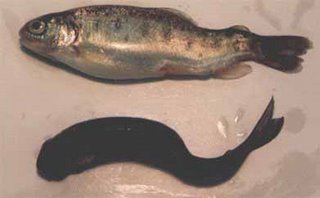 .. California, Montana, Washington, Oregon, Wyoming, Idaho, Utah, Colorado, New Mexico, and Nevada all have rapidly spreading whirling disease in their fish populations. This insidious disease attacks the fry of the year and produces crooked fish - easily preyed upon. A European disease, it affects native species while allowing the invasive Brown Trout to escape with little or no harm. It is coming to a stream in your backyard.
.. California, Montana, Washington, Oregon, Wyoming, Idaho, Utah, Colorado, New Mexico, and Nevada all have rapidly spreading whirling disease in their fish populations. This insidious disease attacks the fry of the year and produces crooked fish - easily preyed upon. A European disease, it affects native species while allowing the invasive Brown Trout to escape with little or no harm. It is coming to a stream in your backyard. .. New Zealand Mud Snails are small insidious invaders that out compete native forms, multiply rapidly, provide minimal nutritive value to trout, and reduce trout food by devouring native vegetation and the bugs that live there.
.. New Zealand Mud Snails are small insidious invaders that out compete native forms, multiply rapidly, provide minimal nutritive value to trout, and reduce trout food by devouring native vegetation and the bugs that live there. .. The snails can live out of the water for long periods of time, reproduce asexually, and are being carried by fly fishers along our precious trout waters. They are so small that defensive measures are tedious and must be carried out deliberately. They are coming to a stream in your front yard.
.. The snails can live out of the water for long periods of time, reproduce asexually, and are being carried by fly fishers along our precious trout waters. They are so small that defensive measures are tedious and must be carried out deliberately. They are coming to a stream in your front yard.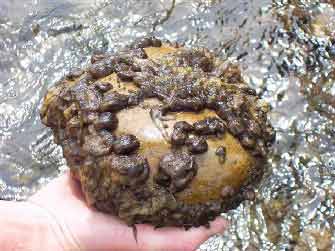 .. Rock Snot ; didymo algae (Didymospheniageminata), is moving all around us. It coats and clings to rocks and other substantial substrate. It reduces the living areas for surface clinging forms like Caddis Flies & May Flies. If you don't think that this will impact your fishing you need some leaky waders. Rock snot is probably already in your neighborhood and harming your fishing.
.. Rock Snot ; didymo algae (Didymospheniageminata), is moving all around us. It coats and clings to rocks and other substantial substrate. It reduces the living areas for surface clinging forms like Caddis Flies & May Flies. If you don't think that this will impact your fishing you need some leaky waders. Rock snot is probably already in your neighborhood and harming your fishing.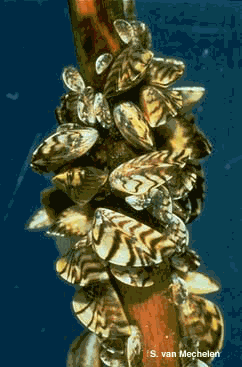 .. Zebra Mussels have persistently marched from bilge water in the Great Lakes to most of the upper Mississippi and Missouri River systems. These tenacious shellfish will grow anywhere and can clog pipes, foul chains, plug water inlets, clog sewage discharge, and multiply at a rate that makes mice & rabbits seem stodgy.
.. Zebra Mussels have persistently marched from bilge water in the Great Lakes to most of the upper Mississippi and Missouri River systems. These tenacious shellfish will grow anywhere and can clog pipes, foul chains, plug water inlets, clog sewage discharge, and multiply at a rate that makes mice & rabbits seem stodgy... Invasive fish species are one of the most damaging forms of ecological threat. The legacy of uninformed and indiscriminate 19th century aquaculture is with us today. It is a continuing and growing threat to native species. This is a thorny problem that is both cultural and ecological.
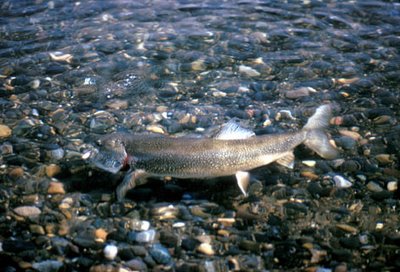 .. The Lake Trout in Yellowstone Lake has greatly reduced the native population of Cutthroats. Invasive Brown Trout, Brook Trout, & Rainbow Trout have reduced the numbers of native species in the Madison River, Slough Creek, the Gallatin River, The Gibbon River, and other streams of the area. Both fly fishers and feather merchants see fish as a catchable resource and are loath to decry the invaders. This cultural perspective asks us to decide if we value native fish, in their native setting - or not.
.. The Lake Trout in Yellowstone Lake has greatly reduced the native population of Cutthroats. Invasive Brown Trout, Brook Trout, & Rainbow Trout have reduced the numbers of native species in the Madison River, Slough Creek, the Gallatin River, The Gibbon River, and other streams of the area. Both fly fishers and feather merchants see fish as a catchable resource and are loath to decry the invaders. This cultural perspective asks us to decide if we value native fish, in their native setting - or not... This condition is already in your neighborhood and requires all of us to confront a very basic question: are all fish in all waters of equal value? Fly fishers shy away from this question because it jeopardizes their sport. Feather merchants shy away from the question because it jeopardizes their business. The general non-fishing population could care less - for the moment.
.. This question has been answered in a surprising way by Ronald Bailey in the ReasonOnlie piece - The Exotic Species War. It has also been obliquely addressed by our neighbor Skyblu at Invasive Species. If this condition is viewed as a war it may have no satisfactory outcome. This could be the Viet Nam or Iraq of fly fishing. The eventual invasion of all suitable waters by flying carp or grass carp, or killer Brown Trout. It bears thinking about both in terms of cultural values and biodiversity.
__________________
FOOD FOR THOUGHT
Salmonid Parasites | What Is Whirling Disease? | Whirling Disease Movies | More Whirling Disease Movies | Invasive Species Weblog | New Zealand Department of Conservation | New Zealand Bio Security | Manitoba Water Stewardship | California Water Resources | Fishing In Yellowstone | Invasive Threats to Yellowstone Fisheries | Effects of Lake Trout on Native Cutthroat in Yellowstone Lake | Protect Your Waters | California Mud Snail Defenses | California's Noxious Algae | Effects of Invasive Fish in California | Invasive Fish Threaten Oregon Salmon | New Zealand Mud Snails on Deschutes | Eurasian Milfoil & New Zealand Mud Snails in Washington | Panther Creek Idaho Destroyed by Invasive Fish | Idaho Invasive Species Teaching Position | Brown Trout Causing Extinction of Native Arizona & Colorado Fish | Nutrient Distribution Altered by Invasive Species | Amur Gobi In Columbia River | Atlantic Salmon Threaten Alaska Fishery | More Atlantic Salmon in Alaska |FOOD FOR THOUGHT





.jpg)






